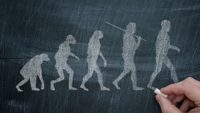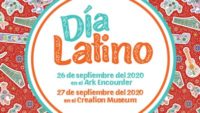By Ken Ham Last week I was interviewed on American Family Radio’s The Hamilton Corner program on very timely topics: how the Bible can be used to fight racism and prejudice, and how God’s Word also explains the origin of the various people groups. I encourage you to listen to this encouraging program that aired on almost 200 radio stations across America. The host of this program, Abraham Hamilton, heard me give a talk on the topic of racism over 10 years ago in Texas, and it had a profound impact on him. He invited me to join him on [More]
By Sarah Chaffee On this episode of ID the Future, host Jay Richards interviews historian of science Michael Keas about a new documentary claiming that Copernicus’s heliocentric model of the solar system “demoted” humans from the place of honor at the center of everything. Neil deGrasse Tyson champions this persistent myth in episode 8 of the new National Geographic series Cosmos: Possible Worlds. The reality is quite different. As Keas explains, in Copernicus’s day, the Earth was thought to be at the bottom of the universe, the “sump” where all the filth collected, while the starry heavens were considered the [More]
Beluga whales don’t select their friends according to what Darwinists would expect, a new Florida Atlantic University study shows.1,2 The research findings are taken from ten Arctic beluga whale ranges, including Alaska’s Yakutat Bay, Cook Inlet, Norton Sound, Canada’s Husky Lakes, Russia’s Gulf of Anadyr, and a small population by Norway’s Svalbard.2 More… …read more Source: icr.org
By Ken Ham If you visit the Ark Encounter, you’ll see exhibits that teach all humans are one race and thus we’re all one family. But that is obviously racist. And you will see lots of female staff here at the Ark, so obviously we’re anti-women. And you will also find exhibits that explain that the gospel message is for all human beings, and our burden is for all to be saved for eternity. So we are obviously anti-humanity. You just have to understand what all the exhibits really mean, even if they don’t seem to teach it. And all [More]
This month (July 2020), multiple astronomical objects highlight God’s glory displayed in the heavens.1 For the next two weeks, all five planets visible to the naked eye—Mercury, Venus, Mars, Jupiter, and Saturn—appear shortly before dawn for observers in the continental United States.2 However, Mercury, Jupiter, and Saturn are all low on the horizon at that time, so an unobstructed view of th… More… …read more Source: icr.org
By Harry F. Sanders, III Gregor Mendel is perhaps one of the most well-known scientists in history. …read more Source: AIG Daily
By Ken Ham Expand your DVD library with resources from Answers in Genesis that you can watch again and again or share with others during our “ Buy any three Answers magazine issues, Buddy Davis music CDs, or pocket guides, and get three of your choice of magazine issues, CDs, or pocket guides for free. We’re also having another sale, this one also running through the end of next month (August 31, 2020). Buy any three of the select Answers magazine issues, Buddy Davis music CDs, or pocket guides, and get three of your choice of magazine issues, CDs, or [More]
By Avery Foley New to homeschooling? Here are five quick tips to anyone beginning to homeschool, plus some bonus resources, that will help you get started. …read more Source: AIG Daily
By Sarah Chaffee On this episode of ID the Future, Andrew McDiarmid reads a recent article from Salvo magazine, “Bits and Bytes at the Bottom.” In the essay, systems engineer Ken Pedersen and Discovery Institute senior fellow Jonathan Witt begin by noting that scientific materialism sees reality as the result of accidental collisions and combinations of elementary particles–a worldview devoid of ultimate meaning and purpose. Many scientific materialists expressed confidence that any shortcomings in their paradigm would be shorn up by fresh discoveries soon enough, but as Pedersen and Witt explain, a funny thing happened on the way to the [More]
By Ken Ham How Do You Define Success? …read more Source: AIG Daily
By Eric H. Anderson On this episode of ID the Future, Andrew McDiarmid concludes his conversation with Eric Anderson, one of the co-authors of the new Discovery Institute Press book Evolution and Intelligent Design in a Nutshell. Today they talk about Anderson’s second of two chapters in the book, where he explores the challenges of building a self-replicating 3D printer, and the light this sheds on the origin-of-life community’s search for their Holy Grail, a self-reproducing molecule that could have kickstarted the evolutionary process on the early earth. In their conversation, Anderson suggests that there are engineering principles involved in [More]
By Ken Ham A big part of the Ark Encounter and the Creation Museum are our two zoos—Ararat Ridge Zoo at the Ark and Eden Animal Experience at the museum. Families love meeting animals, such as our kangaroos, zebroids (a zorse and a zonkey), coatis, sloths, camels, and getting a biblical perspective on each animal—including an understanding of what it means that God made “kinds” of land animals. And you can meet our zoo animals again and again for years to come with a lifetime boarding pass to the Ark Encounter. <img …read more Source: Ken Ham AIG
A comprehensive critique of theistic evolution. …read more Source: creation.com
By Ken Ham If you’re an upper middle school or high school student, mark these dates on your calendar—November 5–7, 2020. Those three days, we’re hosting our annual Creation College Expo at the Ark Encounter in Northern Kentucky. Oh, and did I mention this event is free—and it includes free admission to the Ark Encounter? Many of the nation’s leading Christian colleges and universities—and only those who will sign AiG’s Tenets of Creation statement, holding to biblical creation and a young earth—are represented at this exciting event. Students in grades 7–12 can visit one-on-one with representatives from these schools, learn [More]
A recent science news video shows barium-marked fluoroscopy of a ghost crab’s gut teeth in action. The video reveals how that species of crab can control friction of its gastric mill teeth (i.e., teeth inside its digestive gut) in order to communicatively project growling noises.1 Gut teeth are well-known as components in crab digestive systems, since crabs (like lobsters and crayfish) have no teeth in their mouths. … More… …read more Source: icr.org
By Ken Ham Most Bible commentaries state that the site of the Garden of Eden was in the Middle East, but what does Scripture actually tell us? …read more Source: AIG Daily
By Ken Ham We work hard to ensure both the Ark Encounter and the Creation Museum are friendly towards all our valued guests, no matter when they come to visit. But once each year here in Northern Kentucky, we host an event especially for those in the Deaf community. We’re thrilled each year to see hundreds of Deaf individuals come and learn about the truth of God’s Word and the gospel. Our annual Deaf Days are very popular, and we’re thrilled each year to see hundreds of Deaf individuals come and learn about the truth of God’s Word and the [More]
The United Nation’s Intergovernmental Panel on Climate Change (IPCC) has recently claimed that agriculture is a major producer of greenhouse gases and should be considered a climate “villain.” However, the calculations that formed the basis of these claims completely neglected the fact that crop plants scrub the atmosphere of carbon dioxide on a massive scale, and thus help lower greenhouse gasses. This flawed global warming res… More… …read more Source: icr.org
The Salt Range of Pakistan has yielded some very interesting fossils-that according to evolution should not have been found! …read more Source: creation.com
The field of modern optics owes much to the creationist who invented the kaleidoscope two centuries ago. …read more Source: creation.com
By Dr. Terry Mortenson Nobody should minimize the danger of errors, especially when we teach error to others. …read more Source: AIG Daily
By Dr. Nathaniel T. Jeanson Repeated misrepresentations of creationist views protect the legal basis for excluding creationism from the classroom. …read more Source: AIG Daily
By Ken Ham According to a new Gallup poll, more Americans (43%) said buying or wearing fur clothing is morally wrong than said sex outside of marriage (27%), divorce (18%), or homosexual acts (32%) were unacceptable. Well, you could sum up this poll with one verse of Scripture, “they exchanged the truth about God for a lie and worshiped and served the creature rather than the Creator” (Romans 1:25). The answers given to the questions in this national survey really reflect how arbitrary the standard for morality is in our nation. The answers given to the questions in this national [More]
How do I include a creation perspective? …read more Source: creation.com
By Dr. David Menton How the fossil record, evolutionary assumptions, artistic license, and anatomical differences do NOT confirm common ancestry between humans and apes. …read more Source: AIG Daily
By Ken Ham We’re excited to announce the dates for our 2020 Día Latino event—September 26 at the Ark Encounter and September 27 at the Creation Museum. This event is very popular and is a wonderful outreach to the Latino community here in the United States and for those who visit from Central and South America. Día Latino is a wonderful opportunity to equip our brothers and sisters in Christ and reach out to unbelievers. If you’re a Spanish-speaker, join us for this exciting two-day event. Spanish signage and captions will be available, along with Spanish interpreters, so Spanish-speakers can [More]
The astonishing numbers of abortions performed each year is indicative of the complete loss of society’s Judeo-Christian foundations, which should drive Christians to their knees in prayer. …read more Source: creation.com











































